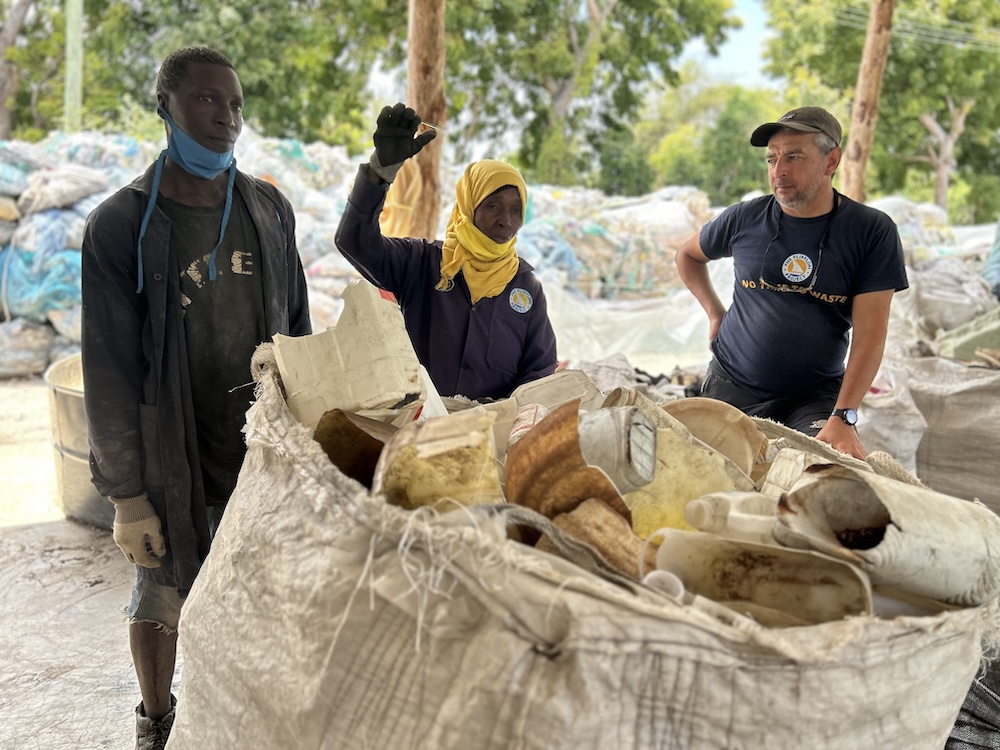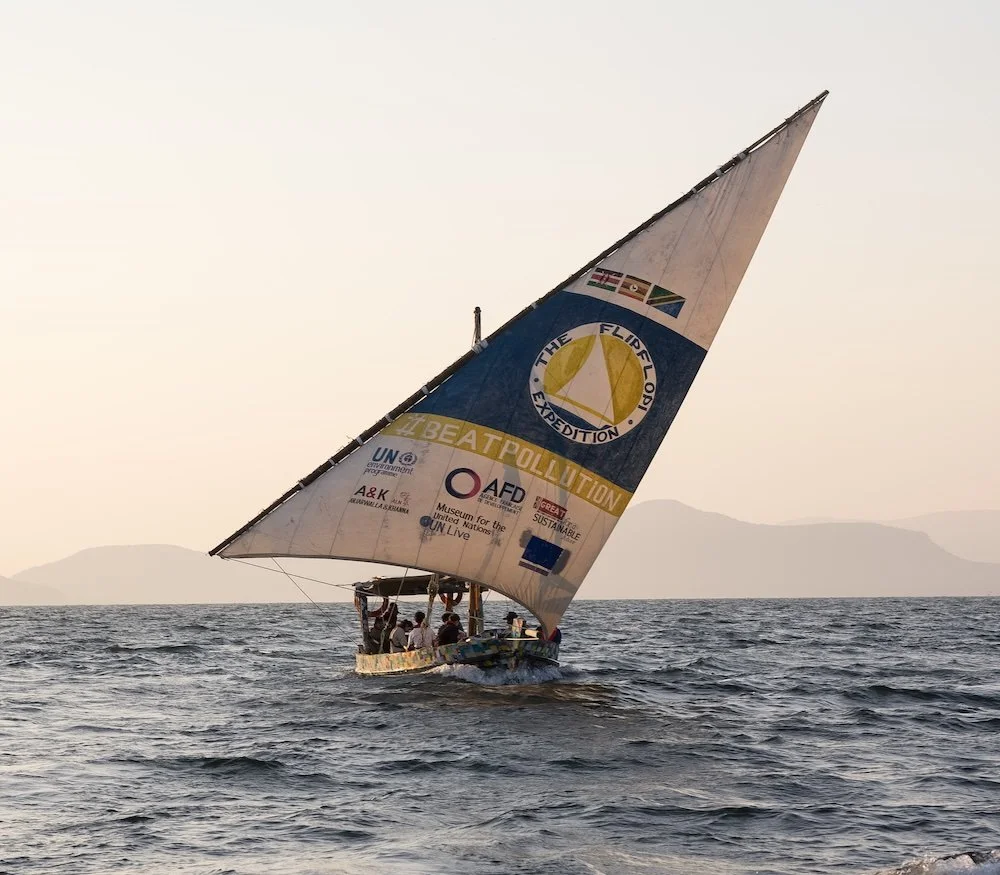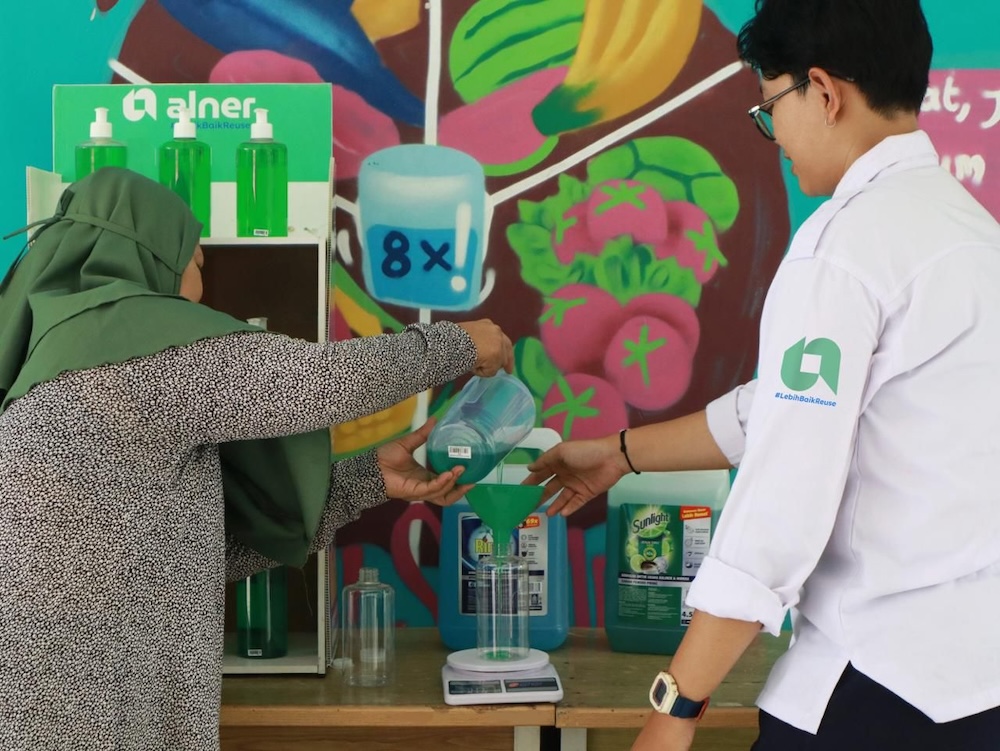A visit one year later
In September 2025, I visited The Flipflopi Project Foundation’s work on Amu Island, Lamu County – one of Kenya’s small community projects supported through the OCEAN Grants Programme. As an OCEAN Committee member, it was inspiring to witness firsthand how a project that once existed only on paper has become a thriving example of community-led circularity one year into implementation.
Flipflopi’s story began in 2016 with an inspiring idea: to build a dhow (a traditional sailing vessel) entirely from recycled plastic as a symbol of hope and action against marine pollution. Nearly a decade later, through the OCEAN Grant, Flipflopi has extended its work from Amu Island to Pate Island, bringing along valuable lessons, partnerships, and optimism for cleaner, more sustainable coastal communities.
Circular solutions rooted in local reality
The current phase focuses on integrating Beach Management Units (BMUs) – the community-based organisations responsible for coordinating and overseeing local marine resource management. This approach strengthens local ownership and aligns perfectly with OCEAN’s vision of empowering communities to become stewards of their marine environments.
With OCEAN’s support, Flipflopi has established four waste collection points across Pate Island, with a baler stationed in Siyu. Waste gathered from the villages is periodically transported to Lamu for processing and recycling. The logistics are simple, locally led, and effective, but the human impact runs far deeper.
Everyday empowerment in action
Across the villages we visited, I met women and men whose daily work is quietly transforming both their environment and their livelihoods. Most waste collectors are women over 30, many with limited formal education and few income opportunities. Yet Flipflopi retains and uplifts those who show commitment and skill.
Take Mama Fatma from Kashmiri Village, an underserved neighbourhood in Amu Island. She began working as a collector in the early days of Flipflopi’s outreach, sorting plastic on some days to supplement her income. Over time, she learned to identify plastics by type – HDPE, PET, PP, and others – and her precision earned her the role of trainer and supervisor at the Material Recovery Facility.
“Sometimes even I ask her which plastic is which,” admits Abubakar, the project coordinator, smiling with pride.

Collectors are paid per kilogram of waste. HDPE, for example, earns KES 16 per kg, and they also receive Bonga Points that can be redeemed at a local shop for food or household goods. Plans are underway to expand redemption options to include school fee payments. These small incentives add dignity to waste work and help meet essential household needs.
Leadership grown from within
Abubakar’s own journey mirrors the project’s evolution. He first joined Flipflopi as a research assistant studying Swahili boatbuilding traditions, how dhows were made, the woods used, and the stories carried in their sails. Later he became a community assistant supporting plastic collection, and today he serves as project coordinator, leading the OCEAN project teams across Pate and Lamu.
During our walks through neighbouring villages, he greeted collectors by name. The trust between him and the community was palpable. Each month, he convenes maskani sessions – informal community dialogues – where collectors share concerns and ideas, from safety gear for the hot season to better transport for full loads. It’s a small but powerful example of leadership nurtured from within the community itself.
Shifting narratives about “waste”
In Pate, waste collection is gradually shifting from a stigmatised task to a shared act of environmental responsibility. Through close collaboration with BMUs and the county government, environmental care is becoming a community value-something to be practiced and proudly passed on.
As Dipesh, one of Flipflopi’s long-time advocates, told me, “We should move beyond saying waste is wealth. What matters is how responsibly we handle it.” His point resonated: true circularity is not only about income but about shifting mindsets toward long-term responsibility for our oceans.
Learning from Flipflopi
Flipflopi’s success underscores the importance of relationships with communities, county authorities, and partners. Sustainability here is not just innovation; it’s about making environmental action decent, dignified and desirable.
Another striking lesson is skill transfer. Lamu’s long tradition of wooden boatbuilding is now blending with a new craft – recycled plastic carpentry – to produce boats, benches, and household furniture. It’s cultural adaptation in motion, merging heritage with modern sustainability.
Reflections on the OCEAN vision
This visit reminded me why OCEAN exists: to enable small, community-driven initiatives to test and scale local solutions to global problems. Seeing Flipflopi’s work up close affirmed how these grants nurture innovation, foster partnerships, and empower people to act for their environment.
Floating hope
As I left Amu Island, I felt a renewed sense of purpose. Watching local communities take charge of their environment with responsibility skill, and quiet pride, was a humbling reminder that meaningful change grows from within.
Flipflopi’s journey from a single recycled-plastic dhow to a thriving circular community model captures the heart of the OCEAN Grants Programme: connecting local action to global ambition and proving that when people and the planet thrive together, hope floats.
Asma Hadi Awadh is a Marine and Coastal Conservationist and a member of the OCEAN Expert Committee.



